Today’s Church is being swept by a revival of New Thought, now called Positive Thinking, Possibility Thinking, Positive Confession, Positive Mental Attitude and Inner Healing. We are very concerned that this time New Thought, which represents inside the church what New Age is in the secular world, will not be forced out, but will remain within the evangelical to contribute to the growing confusion and seduction. – D. Hunt & T.A. McMahon
How to Define Hyper Faith
The Bible says in 1 Peter 3:15, but in your hearts honor Christ the Lord as holy, always being prepared to make a defense to anyone who asks you for a reason for the hope that is in you; yet do it with gentleness and respect. [1 Pet. 3:15 ESV] This passage addresses what is the responsibility of every believer. First, those of us who have made Jesus the Lord of our lives are to always be prepared to make a defense. This word translated, defense is the Greek, apologia. It could literally be translated as, an apology. Not an apology as being sorry, but a reasoned, factual defense of one’s opinion, position, or stand. It is an argument in the legal sense.
[bctt tweet=”What is Hyper Faith? Is there a formula God must obey to give us cash? Or is it just Complete Bull!”]
We get the word, apologetics from it. Apologetics is the art of the defense of the Christian faith. The Holy Spirit through the Apostle Peter calls each of as believers to be apologists, in that sense. Each believer is charged with knowing what we believe, and why we believe it to the extent that we can make a reasoned defense to anyone who inquires or challenges what we believe.
This passage tells us secondly how we are to make this defense, or rather what our attitude is to be when doing so. We are to do it with, as the ESV states, gentleness, and respect. Other translations render this as, meekness and fear, fear and humility, etc. The implication here is to approach our defense of the Christian faith with an attitude of mildness and an awe of the eternal implications involved in doing so. Even though the Holy Spirit has given these instructions to the Church, many who would refer to themselves as apologists don’t approach their defense of the faith in this manner. Rather they come off as maniacal bullies or Nazis for truth. I have no desire to be in that camp. I am not a “heresy hunter”. However, we really don’t have to hunt heresy. It is very apparent in this hour. The Bible says,
But there were also false prophets among the people, even as there will be false teachers among you, who will secretly bring in destructive heresies, even denying the Lord who bought them, and bring on themselves swift destruction. 2 And many will follow their destructive ways, because of whom the way of truth will be blasphemed. 3 By covetousness they will exploit you with deceptive words; for a long time their judgment has not been idle, and their destruction does not slumber. [2 Pet. 2:1 – 3 NKJV]
The Holy Spirit is telling us through the Apostle Peter that just as surely as false prophets plagued the Old Testament saints, so they would the New Testament Church. For 2,000 years of Church history, this has been the case, and the deception has grown in frequency and intensity, just as our Lord said it would. [See Matt. 24:3 – 8] This fact is what has moved me to share this present series of teachings. I am sounding an alarm. I am sounding a clarion call. If you want to walk free of error and deception doctrinally, you are going to have to make it your quest to know your Bible. You are going to have to thoroughly familiarize yourself with the great doctrines of the scriptures.
Hyper-faith Exposed Prosperity Gospel Heretics
What do we mean by the term, “hyper-faith”? The prefix hyper describes that which has gone over or is blown out of proportion. That is exactly what we mean by, hyper-faith. It is faith that is overstated or is blown out of proportion. It is faith out of balance. That which I am referring to as “hyper-faith” for the sake of this series is also known as “Word-faith”, “Word of faith”, or the “Faith movement”. It is generally believed that this movement is the fruit of the Charismatic movement or classic Pentecostalism. This is not the case, however. The roots of this movement and the subsequent theology coming out of it can be traced directly back to the metaphysical and mind-science cults. I will not attempt a lengthy study demonstrating this fact. That has been done very well by others, and I would direct the reader to these resources. [See, for example, A Different Gospel by D. R. McConnell where this connection is clearly and thoroughly documented.]
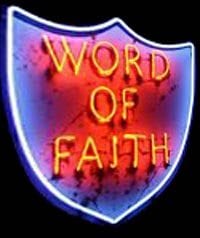 I come to this section with a bit of a heavy heart. First, because I was personally involved in this movement for many years. My wife and I Pastored a Word of Faith Church for over 13 years in Central Iowa. I have taught these doctrines extensively on both the congregational and Bible school levels. I have poured over books, study guides, CDs and DVDs of these teachings. I do not come to this topic as a novice or as someone depending on second-hand knowledge. I know that of which I speak. A few years ago I began to compare the doctrines of the faith movement with the New Testament and found Word/Faith theology seriously wanting.
I come to this section with a bit of a heavy heart. First, because I was personally involved in this movement for many years. My wife and I Pastored a Word of Faith Church for over 13 years in Central Iowa. I have taught these doctrines extensively on both the congregational and Bible school levels. I have poured over books, study guides, CDs and DVDs of these teachings. I do not come to this topic as a novice or as someone depending on second-hand knowledge. I know that of which I speak. A few years ago I began to compare the doctrines of the faith movement with the New Testament and found Word/Faith theology seriously wanting.
The second reason I have a heavy heart is because I have family and dear friends still involved in this movement. Some of which are there directly due to my influence and teaching. I have resigned myself to the fact that some will reject that which I will share here. Some may even become angry and offended, although I assure you that is not my motivation or intention in coming to this topic. Also, I am not sharing along these lines because I have a “dog in the hunt” or an “ax to grind”, to use a couple of popular colloquial expressions.
I come to this topic out of a love for the truth of the gospel, and a love for the people and leaders ensnared in this movement with the hope that some may examine that which we will share in greater detail for themselves and come to the understanding that Word/faith theology is indeed not the gospel of the New Testament, is not the faith once delivered to the saints, and is in fact another or a different gospel. [See Galatians. 1:6]
As has been the case with all of the movements we have examined, this will not be an exhaustive treatment of this topic. We will seek to address ourselves to the main doctrines of the Word of Faith Movement that identify it as a product of seducing spirits and doctrines of demons. [See 1 Timothy. 4:1]
The main doctrines of the Word-Faith movement are:
Kenneth Copeland and WOF KENOTIC THEOLOGY:
 What exactly is, kenotic theology? It comes from the Greek kenosis, and speaks of a “self-emptying”. In Philippians 2:5 – 8 we are told that Christ humbled Himself coming in the form of a servant, becoming obedient unto death, even the death of the cross. In this sense, Christ emptied Himself of the outward manifestations of deity to identify with mankind. However, He never emptied Himself of His deity, as in ceasing to be divine and being merely a man. Kenotic theology, states that during Jesus’ earthly ministry He ceased to be divine. For example, Kenneth Copeland states,
What exactly is, kenotic theology? It comes from the Greek kenosis, and speaks of a “self-emptying”. In Philippians 2:5 – 8 we are told that Christ humbled Himself coming in the form of a servant, becoming obedient unto death, even the death of the cross. In this sense, Christ emptied Himself of the outward manifestations of deity to identify with mankind. However, He never emptied Himself of His deity, as in ceasing to be divine and being merely a man. Kenotic theology, states that during Jesus’ earthly ministry He ceased to be divine. For example, Kenneth Copeland states,
“Why didn’t Jesus openly proclaim Himself as God during His 33 years on earth? For one single reason. He hadn’t come to earth as God, He’d come as man.”
In all fairness, Kenneth Copeland does not subscribe to the thought that Jesus was not God. He does believe that Jesus did not come to earth as God and that Jesus never claimed to be God during His earthly ministry.
In fact, he claims to have received a direct revelation from God, in which Jesus allegedly told him,
“…I didn’t claim I was God; I just claimed I walked with Him and that He was in Me…”. In addition, Copeland asserts that, “This man–Jesus, was a carbon copy of the one who walked through the Garden of Eden.” He gives his reason as to why it had to be this way, in the following statement, “He (God) has to have a man like that first one. It’s got to be a man. He’s got to be all man. He cannot be a God and come storming in here with attributes and dignities that are not common to man. He can’t do that. Its not legal.”
At the time of the alleged revelation from Jesus that Copeland ‘received’, it produced great concern among a number of Christians, one of whom was the late cult researcher, Walter Martin, who actually wrote Copeland expressing his concern at this ‘revelation’. Sadly, “Copeland refused correction or even correspondence on the subject and re-issued his position, standing by his alleged revelation.” In the August 1988 issue of Copeland’s Believer’s Voice of Victory magazine, Kenneth Copeland made these disquieting remarks:
“Jesus hadn’t come to earth as God; He’d come as man. He’d set aside His divine power and had taken on the form of a human being–with all its limitations.” And, that Jesus lived on earth, “…not as God but as a man.” He also teaches that Jesus prayed, “…not as the divine One who had authority as God but as a man…” And that Jesus never believed Himself to be “…the Most High God.”
The Evangelical Dictionary of Theology informs us of the orthodox Christian view on the kenotic theory: “…all forms of classical orthodoxy either explicitly reject or reject in principle kenotic theology. This is because God must be affirmed to be changeless (Heb. 13:8); any concept of the incarnation that would imply change would mean that God would cease to be God.” That is pretty serious, wouldn’t you agree?
In contrast with Copeland’s belief that Jesus did not claim to be God while on earth, the Bible clearly teaches that He did. In John 8:58 Jesus says of Himself, “…Verily, verily I say unto you, before Abraham was, I AM.” The term I AM, is of course one that God has assumed as His name and was recognized by the Jews as a title of deity (see Ex. 3:14; cf. Isa. 44:6; 47:8). Also, the high priest’s reaction to Jesus’ use of the title, in the Gospel of Mark, suggests that he considered Jesus’ utterance of it as being a blasphemous claim to deity (Mark 14:61-63). Jesus makes it perfectly clear in John 8 that He is most certainly God (cf. John 3:13; 5:18; 10:33; 17:5). Noted American theologian A.A. Hodge, speaks truly on this matter of the Person of Christ: “Jesus of Nazareth was very God, possessing the divine nature and all its essential attributes. He is also true man, His human nature derived by generation from the stock of Adam. These natures continued united in His Person, yet ever remain true divinity and true humanity, unmixed and as to essence unchanged. So that Christ possesses at once in the unity of His Person two spirits with all their essential attributes, a human consciousness, mind, heart and will…. Yet it does not become us to attempt to explain the manner in which the two spirits mutually affect each other, or how far they meet in one consciousness, nor how the two wills cooperate in one activity, in the union of one person. Nevertheless, they constitute as thus united one single Person, and the attributes of both natures belong to the one Person.”
Perhaps the strongest verse which attests to Christ’s divinity is Colossians 2:9: “For in Him dwelleth all the fullness of the Godhead bodily.” This verse plainly states that the fullness of the Godhead IE., divinity or divine essence, became incarnate and indwelt the body of Jesus Christ. It does not mean that only the will of God dwelt in Him, nor even of the divine knowledge alone, but that the whole deity had become incarnate and dwelt in human form. Jesus was not just a man who had God dwelling in Him, He was wholly God and wholly man. Hebrews 13:8, an oft-used verse by both Faith movement teachers and followers alike, is proof that Jesus was wholly divine, and yet in human form during His ministry on earth, for He is forever unchangeable. According to Philippians 2:6-8, Jesus came to earth in the form of God, and in the form of a servant. “The eternal, infinite form of God took upon Himself flesh” (John 1:1, 14).
To Kenneth Copeland’s credit, he has taught correctly on occasion that Jesus, “…was and is God manifested in the flesh.” Yet, as we have seen, Copeland elsewhere denies Christ’s having come to earth as wholly man and wholly God. I hope that Brother Copeland would soon realize his own confusion and inconsistency and teach only the truth, that Jesus came to this earth as God manifested in the flesh (see Isaiah. 9:6; Romans. 8:3; 1Timothy. 3:16; Hebrews. 2:14).
WOF Errors on THE CROSS AND THE BLOOD ATONEMENT:
 The cross of Christ is the most central doctrine of the Christian faith. It was there that Jesus’ work of atonement for mankind was completed, a fact evidenced by Jesus’ own words, found in John 19:30, “…it is finished…” and by Paul in Colossians 1:20: “…having made peace through the blood of His cross…” “It is this doctrine, perhaps more than any other, that has been repeatedly attacked by non-Christian cults and false religions. However, sadly, these attacks on the cross and what Jesus accomplished there are no longer confined to the enemies of the cross outside the Church. Rather, these attacks have now moved inside the walls of Christendom.
The cross of Christ is the most central doctrine of the Christian faith. It was there that Jesus’ work of atonement for mankind was completed, a fact evidenced by Jesus’ own words, found in John 19:30, “…it is finished…” and by Paul in Colossians 1:20: “…having made peace through the blood of His cross…” “It is this doctrine, perhaps more than any other, that has been repeatedly attacked by non-Christian cults and false religions. However, sadly, these attacks on the cross and what Jesus accomplished there are no longer confined to the enemies of the cross outside the Church. Rather, these attacks have now moved inside the walls of Christendom.
The Faith movement is one of these enemies which has surfaced and presented, to the Church at large, a different account of what occurred and what was achieved upon the rugged cross. Kenneth Copeland states quite emphatically in a taped sermon entitled,
‘What Happened From The Cross To The Throne?’, “…if it had been a physical death only, it wouldn’t have worked.” Consequently, Copeland teaches that our redemption was not completed on the cross, but in the pit of hell! I am not making this up!
Where exactly was our redemption purchased? Where was the victory over sin, death, hell, and the grave actually wrought? Does it really matter in the grand scheme of eternity? Some would say no. However, if our authority and standard is the written Word of God, I submit to you that it does matter. Hanging on the cross between two thieves, suspended between Heaven and earth; our Lord after enduring awful pain and suffering and experiencing the cruel mocking and insults of many who stood there that day, hung His head and said, “It is finished”. [John 19:30] I submit to you that these were the greatest words any sinner could have ever heard, albeit at a great price to our Lord. The world’s debt was paid. Divine justice was forever satisfied. The penalty was canceled. This was all accomplished on the cross.
As we said last time, the cross is the most central doctrine of the Christian faith. The Apostle Paul wrote to the Colossians, “Having made peace through the blood of His cross…” [Col. 1:20] This speaks of reconciliation or justifying peace. The enmity caused by sin, the separation between God and man; was bridged, if you will, through the blood of Christ on the cross. There was nothing else to be done. The vicarious sufferings of our Lord on Calvary’s cross were fully sufficient to pay the sin debt all of us owed to a holy God. I am driving this point home for a reason. Quite a different story of our redemption is told by Word-Faith teachers.
Kenneth Copeland for example states, …if it had been a physical death only, it wouldn’t have worked. He and other teachers in the faith movement contend that our redemption was not completed on the cross. Faith teachers employ a metaphysical view of salvation, which spiritualizes the atonement and deifies man. The completion of our redemption, according to Word-Faith theology, is located in hell rather than on the cross, thus depriving the physical death of Christ of the power to atone for our sins, which the Bible attributes solely to the blood of Christ [Lev. 17:11; Heb. 10:10]. The central doctrine of the Christian faith has been plundered. Faith teachers contend that Jesus’ physical death again was not enough. They maintain that Jesus had to die spiritually as well as physically, to actually purchase our redemption.
This teaching is certainly nothing new. There really are no new errors, only old lies repackaged and redistributed. This teaching of Jesus dying spiritually was known to the early church as ‘Devil Ransom Theory’ or ‘The Classical Theory’ or ‘The Fishhook Theory’. The early Church fathers who subscribed to this thesis believed that because of sin man belonged to Satan. In order to save mankind, God is purported to have offered His Son Jesus as a ransom to the Devil. This is in sharp contrast with the Bible’s teaching that Christ had given Himself as an offering for us, and as a sacrifice to God, not Satan (Eph. 5:2; cf. 1Cor. 5:7; Heb. 10:12).
The theory that Christ was a ransom paid to the Devil, did not originate with the Faith movement. It was taught as early as A.D. 230 by Origen and more emphatically by Gregory of Nyssa A.D. 370. This doctrine, however, was always met with the strongest opposition and denial by theologians such as Athanasius A.D. 370; and Gregory of Nazianzum A.D. 390. Never did it become the official and accepted the view of the Church.
Many, if not most, of the people who are part of Word of Faith churches, probably have very little knowledge of the whole “Jesus died spiritually” doctrine. However, it is a major doctrine taught by the key leaders of the movement and therefore needs to be understood. Did Jesus become sin, or you could say, “become a sinner”, at Calvary and thereby experience spiritual death? Did He become sin on the cross, as this doctrine teaches, or was He a sin-offering?
I hold to the position that Jesus was a sin-offering [Isa. 53:10]. I also maintain that he was holy and pure, just as the Old Testament foreshadowed [Ex. 12:5]. Jesus did not go to hell for three days and three nights, and I speak of the burning side of the pit, to redeem mankind from the terrible ravages of sin, as the Jesus died spiritually doctrine claims. Rather, He continued His obedience to the Father. He said at the time of His death, “Father into your hands I commend my spirit” [Luke 23:46]. We referred to the words of Jesus earlier, uttered on the cross, “It is finished” [John 19:30]. Actually, the Greek text reads simply, “Finished!” It is the Greek word, teleo, and speaks literally of things completed or fulfilled.
What was finished on the cross? The work Christ came to do. As of that moment, man’s salvation was complete. Nothing else was needed. If Jesus died a sinner, as this doctrine contends, someone would have to have died to redeem Him from His unregenerate state and provide for His justification. It is clear that is absolutely ridiculous. What about the shed blood of Christ on the cross? Did it redeem us back to God? Not according to some of the Word-Faith teachers. For example, Kenneth Copeland states concerning the shed blood of Christ, “When His blood was poured out, it did not atone. It simply did away with the handwriting of ordinances that were against us. There is really no way to judge such statements other than to label them blasphemy. Concerning this Paul wrote,
For many walk, of whom I have told you often, and now tell you even weeping, that they are the enemies of the cross of Christ: whose end is destruction, whose god is their belly, and whose glory is in their shame who set their mind on earthly things. [Phil. 3:18, 19 NKJV] We can only hope that the proponents of this doctrine don’t know what they are doing, for they are actually denying the Blood Atonement of Jesus Christ, substituting in its place punishment in Hell, etc. Had Jesus actually became literal sin, in other words, had become a sinner, which means that He was now lost and unregenerate while He hung on the Cross of Calvary. He would have then, and you must grasp this, been unacceptable to God for the sins of others. If, on the other hand, He remained pure and Holy as the scriptures assert, then God could accept Him as a substitute on behalf of sinners. [Lev. 4:2, 3]
While emphasizing Christ’s completed work on the cross, are we minimizing the importance of the resurrection? Absolutely not. The Apostle Paul makes it clear in 1 Corinthians 15 the absolute importance of the resurrection. However, you need to understand that the resurrection of Christ was never in doubt. The idea of Jesus suffering in the burning pit of hell, with demons dancing around in hellish glee never happened. Satan was defeated at the cross, and not in hell. Jesus paid the price for all sin. Had there been even one sin not atoned for, Jesus could not have risen from the dead. Due to the fact that Jesus atoned for all sin, and He did so through His death, and His death alone, there was no way that Satan could hold Him in death, nor any of the Old Testament saints for that matter. In other words, the success or victory won on the cross-guaranteed His triumphant Resurrection!
There is little doctrinal teaching done in most Word-Faith churches. In fact, several years ago I shared with an (at the time), fellow Word-Faith pastor that I was going to do an expositional series through the Epistle to the Ephesians, which second only to Romans is the most doctrinal of Paul’s epistles. He commented, “Don’t tell your people that it is doctrinal. They won’t show up!” Sadly, he was right. We have come to the time Paul warned young Pastor Timothy of. A time when, they will not endure sound doctrine, but according to their own desires, because they have itching ears, they will heap up for themselves teachers; and they will turn their ears away from the truth, and be turned aside to fables. [2 Tim. 4:3b, 4 NKJV] We are certainly living in that time.
In many of the more “modern” churches of our day another problem is that we have all but completely removed the great old hymns of the Church. In the so-called “Word” churches the hymns are held in disdain as being “embalmed in unbelief”. And yet, the hymns are great vehicles to teach people doctrine. In the “old days”, if you didn’t learn the great doctrines of the Bible from the pulpit, you certainly could learn them from singing the hymns. Now we have praise and worship songs, led by “praise teams”. While I love this music too, it often is long on Madison Avenue glitz and polish and short on the anointing. Much of it is quickly written and produced to get the album to the stores. The hymns, on the other hand, were mostly born out of the fires of trial and adversity where the authors were in a position where they realized that God was all they had, and then realized He was all they needed. They were not for Christian amusement and entertainment, but rather for vehicles to impart doctrinal teaching to God’s people. I for one pray that churches will bring them back in these last of the Last Days.
If the great doctrines of the Bible were taught then much of the false doctrine that has infiltrated the Body of Christ in this hour would never have gotten off the ground. For example, the whole “Jesus died spiritually” doctrine would never have been given any credence whatsoever. You see, my dear Word-Faith brethren teach a doctrine known as identification, which basically says that Jesus identified with us by becoming sin for us, so that we could become righteous. However, this really is not what the Bible teaches. Rather, the great Bible doctrine of imputation is what actually occurred. The two concepts are vastly different. In the doctrine of imputation, we learn that sin or righteousness can be imputed or charged to another’s account in a legal sense. (Imputation is the act of something being granted or credited to someone.)
When applied to Jesus and His sacrifice as a sin-offering, this indicates that He did not become a sinner, but remained sinless that He might be able to bear the punishment for our guilt that was imputed to Him. In other words, Jesus did not bear the wickedness and the filth of our sinful nature, but He did bear the penalty for that wickedness and filth of our sinful nature, that should have been poured out on us. Our punishment was imputed to Him. Our sins, with regard to their moral character, are our own. They could not by imputation become the sins of someone else. However, Jesus Christ could take upon Himself the punishment for the guilt of our sins, which has reference to the legal liabilities that Christ assumed on our behalf.
The emphasis of scripture over and over again is that Jesus offered up His body as a sacrifice for our sins and that He was put to death in the flesh. In other words, Jesus died physically but not spiritually. Nowhere in the Word of God does it tell us that Jesus died in His spirit. I invite the reader to look up, read, and study the following list of scriptures for yourself: 1 Pet. 2:21 – 24; 1 Pet. 3:18; 1 Pet. 4:1; Col. 1:21, 22; Heb. 10:10; Eph. 2:15. You will see that every one of these scriptures stresses that Jesus offered up His body and His flesh as a sacrifice for sin, not once do they say He died in His spirit.
There is so much more that could be said. The two main doctrines that we have examined, Jesus emptying Himself of His divinity (Kenotic theology), and the Jesus died spiritually doctrine really only scratch the service of the deception that is hyper-faith, or Word-Faith theology. This movement, in my opinion, is the most dangerous force confronting the Church of our day. The faith teachers are to the modern Church what the gnostics were to the early Church. I close with a few quotes from some prominent leaders on our responsibility in teaching the truth and exposing error. Remember that Jesus said, 15″Beware of the false prophets, who come to you in sheep’s clothing, but inwardly are ravenous wolves. [Matt. 7:15 NASB]
Excessive aversion to the controversy may be an indication that a church has no keen sense of possessing truth which is of any great worth, and that it has lost appreciation for the infinite difference in value between truth and error. – James Stalker
While tolerance in personal relationships may be a virtue, tolerance when it comes to truth is a travesty. – Hank Hanegraaff
It has often been said that a person who does not know both sides of a question really does not know either side. Not until he knows what his own doctrinal system sets forth, and what can be said against it, does he know what he believes and why? – L. Boettner
It is a strange curiosity that those Christians who are most adamant that our is the generation that will see the lord’s return–and the end-time deception and apostasy associated with His return–look for signs of this deception outside the Church, in such conspiracies as the New Age movement, and in such cults as Mormonism, Jehovah’s Witnesses and Christian Science. Admittedly, these movements pose potential threats to the Church, but perhaps we would do better to look for the deception of the end-times where Jesus and the New Testament predicted it would occur: within the church, within groups that call themselves ‘Christian’ but which actually preach a different gospel. – D.R. McConnell
False or heretical doctrine must always remain a matter of public evaluation in the Church. The Church cannot (must not) abdicate its duty to examine the doctrine of those who claim to be in its ranks. – D.R. McConnell
Today’s Church is being swept by a revival of New Thought, now called Positive Thinking, Possibility Thinking, Positive Confession, Positive Mental Attitude and Inner Healing. We are very concerned that this time New Thought, which represents inside the church what New Age is in the secular world, will not be forced out, but will remain within the evangelical to contribute to the growing confusion and seduction. – D. Hunt & T.A. McMahon
The study of the kingdom of the cults has taught me many profitable lessons, and this is one of them–error begets error; heresy begets heresy and always in the name of truth, always in the name of the Gospel. – Walter Martin
The Weekly Word is found in Matthew 7:15 – 20. Here the Bible says,
“Beware of false prophets, who come to you in sheep’s clothing, but inwardly they are ravenous wolves. You will know them by their fruits. Do men gather grapes from thornbushes or figs from thistles? Even so, every good tree bears good fruit, but a bad tree bears bad fruit. A good tree cannot bear bad fruit, nor can a bad tree bear good fruit. Every tree that does not bear good fruit is cut down and thrown into the fire. Therefore by their fruits, you will know them. [Matthew. 7:15 – 20 NKJV]
Until next time, this is THE WEEKLY WORD
Pastor Kevin E. Johnson
Seducing Spirits & Doctrines of Demons Article Source.
Connect with Amos37
Stay up to date with Amos37.com eMail update (Weekly)
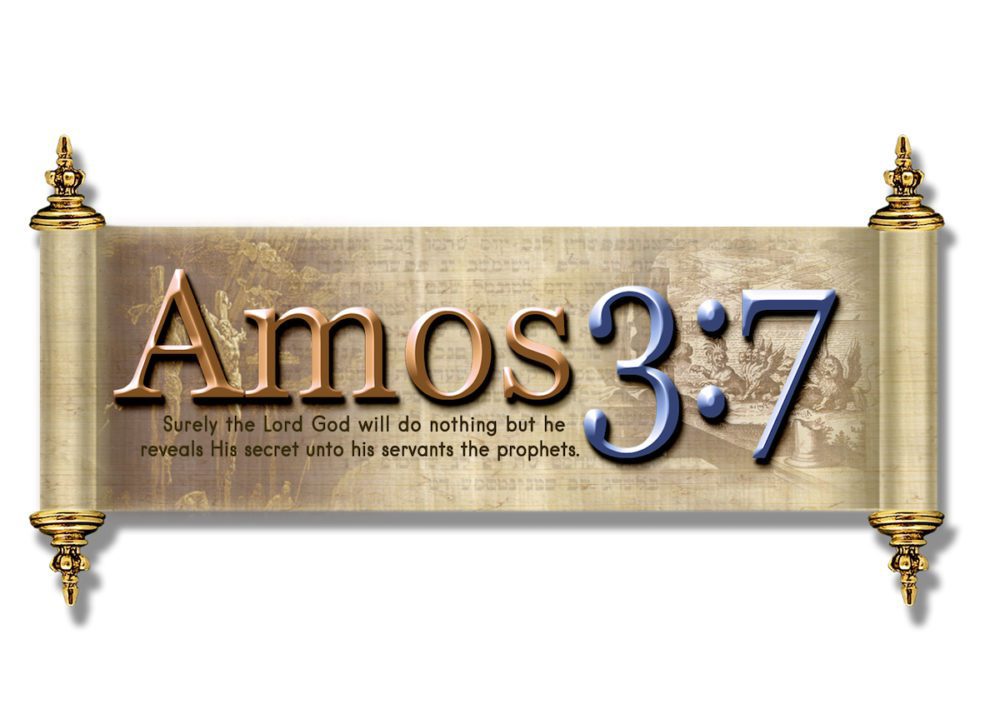
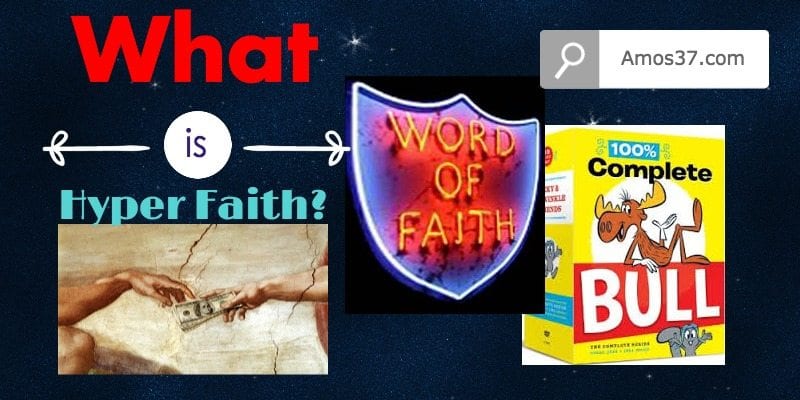
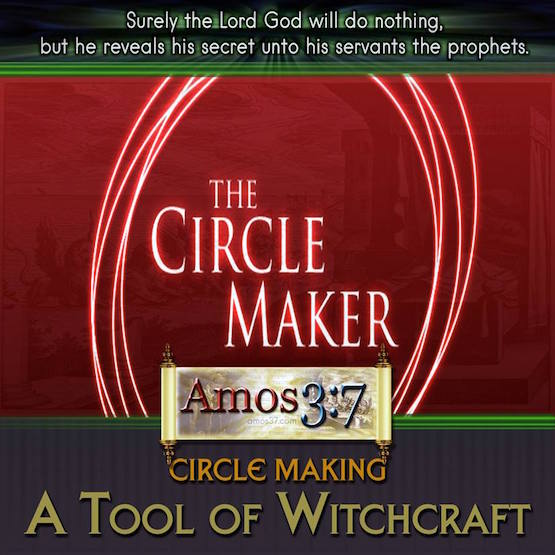

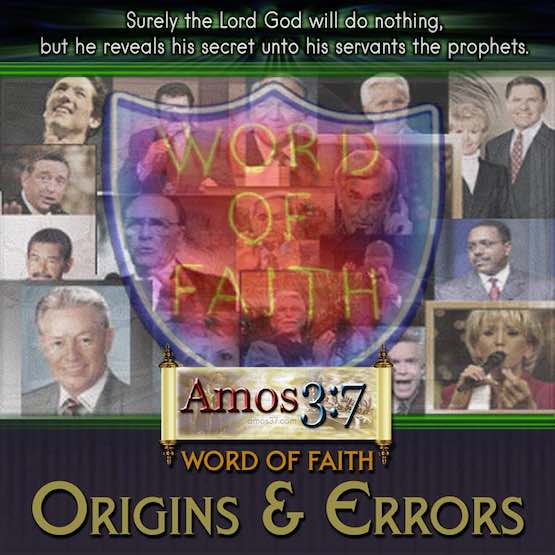
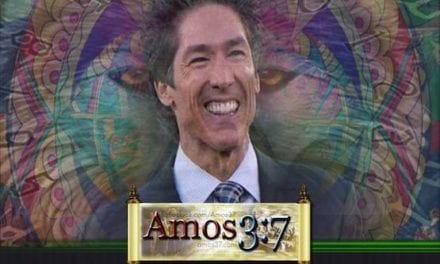












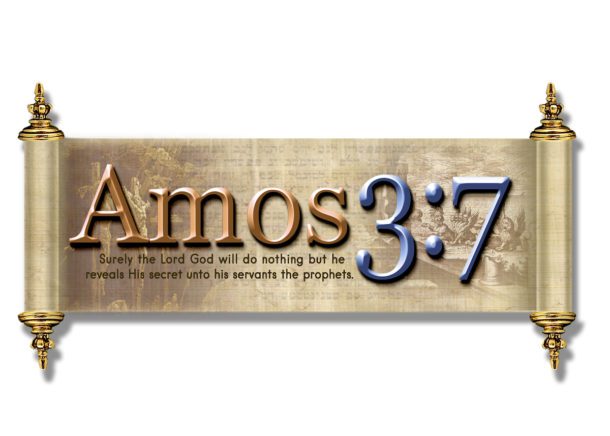

Thanks for your ministry.
Please note our many free resources in English and Spanish, especially the material concerning the Prosperity Movement
http://www.smallings.com/english/books/ProspENG.htm In His bonds, Roger Smalling http://www.smallings.com/index.html
Roger Smalling
Reformation In Latin America